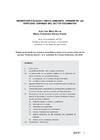Please use this identifier to cite or link to this item:
https://accedacris.ulpgc.es/jspui/handle/10553/58430
| DC Field | Value | Language |
|---|---|---|
| dc.contributor.author | Déniz Mayor, José Juan | en_US |
| dc.contributor.author | Verona Martel, María Concepción | en_US |
| dc.date.accessioned | 2019-12-16T13:07:18Z | - |
| dc.date.available | 2019-12-16T13:07:18Z | - |
| dc.date.issued | 2009 | en_US |
| dc.identifier.issn | 1696-6945 | en_US |
| dc.identifier.other | Dialnet | - |
| dc.identifier.uri | https://accedacris.ulpgc.es/handle/10553/58430 | - |
| dc.description.abstract | La normativa tributaria vigente en España permite acogerse a determinados incentivos relacionados con la protección del medio ambiente. Es el caso de la materialización de la Reserva para Inversiones en Canarias (RIC) en activos relacionados con la “mejora y protec-ción del medio ambiente en el territorio canario” y la Deducción por Inversiones Medio-ambientales. Sin embargo, tales instrumentos no han sido aprovechados por las empresas canarias. En este trabajo se exponen algunas razones explicativas de este fenómeno, conclu-yéndose que la mera existencia de un incentivo fiscal con fines ambientales no es suficiente para su aplicación si no se tienen en cuenta las características de sus destinatarios ni se acom-paña de medidas complementarias. | en_US |
| dc.description.abstract | The tax legislation in force in Spain allows eligible for certain incentives related to envi-ronmental protection. Such are the materialization of the Reserve for Investments in the Canary Islands (RIC) in assets related to the “improvement and environmental protection in the Canary Islands” and the Deduction for Environmental Investments. However, these instru-ments have not been exploited by companies of the Islands. This paper sets out some reasons that explain this phenomenon, concluded that the mere existence of a tax incentive for environ-mental purposes is not enough for its implementation if not taken into account the characteris-tics of their recipients or is not accompanied by complementary measures. | en_US |
| dc.language | spa | en_US |
| dc.relation.ispartof | Hacienda canaria | en_US |
| dc.source | Hacienda Canaria[ISSN 1696-6945] (26), p. 5-84 | en_US |
| dc.subject | 530305 Contabilidad social | en_US |
| dc.subject.other | Incentivos fiscales | en_US |
| dc.subject.other | Protección del medio ambiente | en_US |
| dc.subject.other | Canarias | en_US |
| dc.title | Incentivos fiscales y medio ambiente. Opinión de las empresas canarias del sector secundario | en_US |
| dc.type | info:eu-repo/semantics/article | en_US |
| dc.type | Article | en_US |
| dc.identifier.url | http://dialnet.unirioja.es/servlet/articulo?codigo=2988984 | - |
| dc.description.lastpage | 84 | - |
| dc.identifier.issue | 26 | - |
| dc.description.firstpage | 5 | - |
| dc.investigacion | Ciencias Sociales y Jurídicas | en_US |
| dc.type2 | Artículo | en_US |
| dc.contributor.authordialnetid | 270572 | - |
| dc.contributor.authordialnetid | 216556 | - |
| dc.identifier.dialnet | 2988984ARTREV | - |
| dc.identifier.ulpgc | Sí | es |
| item.grantfulltext | open | - |
| item.fulltext | Con texto completo | - |
| crisitem.author.dept | GIR Finanzas Cuantitativas y Computacionales | - |
| crisitem.author.dept | Departamento de Economía Financiera y Contabilidad | - |
| crisitem.author.dept | GIR Finanzas Cuantitativas y Computacionales | - |
| crisitem.author.dept | Departamento de Economía Financiera y Contabilidad | - |
| crisitem.author.orcid | 0000-0002-6960-1512 | - |
| crisitem.author.orcid | 0000-0002-4257-2299 | - |
| crisitem.author.parentorg | Departamento de Métodos Cuantitativos en Economía y Gestión | - |
| crisitem.author.parentorg | Departamento de Métodos Cuantitativos en Economía y Gestión | - |
| crisitem.author.fullName | Déniz Mayor, José Juan | - |
| crisitem.author.fullName | Verona Martel, María Concepción | - |
| Appears in Collections: | Artículos | |
Page view(s) 1
508
checked on Nov 1, 2024
Download(s)
999
checked on Nov 1, 2024
Google ScholarTM
Check
Share
Export metadata
Items in accedaCRIS are protected by copyright, with all rights reserved, unless otherwise indicated.
